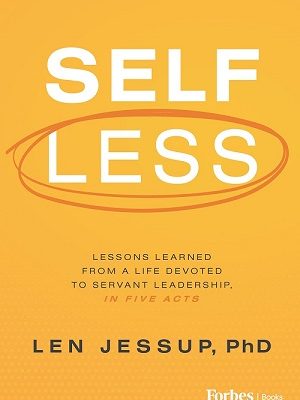Self Less by Len Jessup is a profound exploration of the principles of servant leadership, a leadership style focused on empowering others and fostering collective success rather than pursuing personal ambition. Drawing from his own experiences across academia and business, Jessup organizes the book into five distinct “acts,” each of which delves into key lessons for leaders seeking to embody servant leadership. Below is a detailed summary of the main lessons.

Read: The Power of Self-Discipline
1. Act One: The Heart of Servant Leadership—Putting Others First
Key Lesson: The essence of servant leadership is prioritizing the needs and well-being of others. Jessup emphasizes that leaders should view their roles as serving those they lead, whether employees, students, or team members. True leadership is about facilitating the success of others rather than pursuing personal accolades or power.
Actionable Steps:
- Empathy and Active Listening: Practice listening actively to the concerns, ideas, and feedback of your team. Understand their needs and challenges from their perspective.
- Prioritize Team Development: Invest in the growth and well-being of those you lead by offering mentorship, professional development opportunities, and support.
- Lead with Humility: Adopt a humble mindset where the success of the team or organization comes before your own recognition.
Takeaway: Servant leadership begins with a mindset shift—putting the well-being, development, and success of others at the core of your leadership approach.
2. Act Two: The Power of Collaboration—Strengthening Teams through Trust
Key Lesson: Trust is the foundation of effective leadership. Jessup teaches that servant leaders build collaborative, high-performing teams by fostering trust, encouraging open communication, and ensuring that everyone feels valued and heard.
Actionable Steps:
- Create a Safe Environment: Encourage a culture where team members feel comfortable sharing their ideas, voicing concerns, and taking risks without fear of retribution.
- Model Transparency: Be transparent with your team by communicating openly about challenges, decisions, and changes. This fosters trust and encourages reciprocity.
- Delegate Responsibility: Empower your team by giving them ownership of tasks and trusting them to complete them effectively. Micromanagement undermines trust and hampers collaboration.
Takeaway: Collaboration thrives when trust is present. Leaders must create an environment of psychological safety where everyone can contribute meaningfully and work together toward a common goal.
3. Act Three: Leading by Example—Walking the Talk
Key Lesson: Leading by example is a critical component of servant leadership. Jessup emphasizes that leaders must embody the values and behaviors they expect from others. Integrity, authenticity, and consistency in actions are essential to earning respect and inspiring others to follow suit.
Actionable Steps:
- Demonstrate Integrity: Uphold your principles, even when it’s difficult or unpopular. Being a leader of integrity means aligning your actions with your values.
- Be Authentic: Don’t hide behind a façade of authority. Be genuine in your interactions, showing vulnerability when necessary, which fosters deeper connections.
- Stay Consistent: Your behavior should reflect your leadership principles consistently, regardless of the circumstances. This builds trust and credibility with your team.
Takeaway: Servant leaders lead by example, and their actions speak louder than words. When leaders consistently embody the values they promote, they inspire others to follow suit.
4. Act Four: Navigating Challenges—Resilience and Adaptability
Key Lesson: Servant leaders must be resilient and adaptable in the face of challenges. Jessup discusses how the leadership journey is often fraught with obstacles, but staying focused on the needs of others and the collective goal helps leaders navigate difficult situations effectively.
Actionable Steps:
- Cultivate Resilience: Develop the mental and emotional strength to bounce back from setbacks. Practice mindfulness, self-care, and reflection to stay grounded during tough times.
- Be Adaptable: Embrace change with an open mind and encourage your team to do the same. Flexibility allows you to navigate unforeseen circumstances and turn challenges into opportunities.
- Stay Solution-Oriented: Instead of dwelling on problems, focus on finding solutions. Encourage creative thinking and problem-solving within your team.
Takeaway: Resilience and adaptability are key traits of servant leaders. By staying focused on the needs of others and approaching challenges with a solution-oriented mindset, leaders can successfully guide their teams through adversity.
5. Act Five: Building a Legacy—Inspiring and Empowering Future Leaders
Key Lesson: A central aspect of servant leadership is preparing and empowering others to lead. Jessup explains that true leaders think beyond their own tenure or position, focusing on leaving a lasting, positive impact by mentoring and developing future leaders.
Actionable Steps:
- Mentor and Develop Others: Actively mentor emerging leaders, providing them with the guidance, support, and resources they need to grow and succeed in their roles.
- Encourage Leadership Development: Foster a culture of leadership development where team members are encouraged to take on leadership roles and responsibilities within the organization.
- Think Beyond Yourself: Focus on the long-term success of the organization or team, and ensure that future leaders are well-prepared to continue the work after you move on.
Takeaway: Servant leadership is about building a legacy that extends beyond your individual role. By focusing on empowering and mentoring others, you ensure that your leadership creates a ripple effect that benefits the organization and its people long into the future.
Key Themes in “Self Less” by Len Jessup
Beyond the five acts, Self Less weaves several key themes throughout the book that highlight the essence of servant leadership:
- Humility in Leadership: Jessup constantly reinforces that servant leadership is rooted in humility. Leaders must serve with the mindset that they are part of something larger than themselves and that their role is to uplift others.
- Empathy as a Leadership Tool: A consistent theme throughout the book is the importance of empathy. Servant leaders must deeply understand the experiences, emotions, and needs of those they lead, using empathy to guide their actions.
- Leadership as Service: The overarching message of the book is that leadership is not about wielding power but about service to others. This service mindset is what differentiates servant leaders from more traditional, hierarchical leadership models.
- The Role of Personal Reflection: Jessup encourages readers to engage in regular self-reflection as a means of improving their leadership. By assessing their actions, motives, and impact on others, leaders can continually refine their approach to servant leadership.
- Long-Term Impact: Servant leadership is future-focused, concerned with the long-term success and development of both the organization and its people. Leaders are stewards of their team’s growth and success, thinking beyond their immediate influence.
Conclusion
Self Less: Lessons Learned from A Life Devoted to Servant Leadership, in Five Acts by Len Jessup is a profound exploration of what it means to lead through service, empathy, and humility. The five acts of the book provide a structured framework for understanding and implementing servant leadership in real-life settings. Through trust, collaboration, resilience, and mentorship, Jessup guides readers on how to lead selflessly while building strong, empowered teams that thrive (Amazon).



